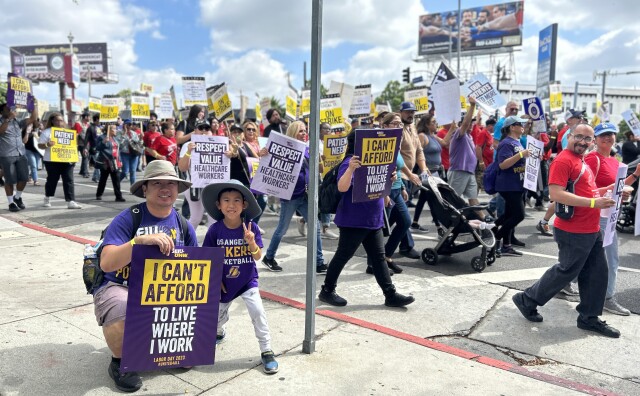Why Was An Acclaimed Spanish Dancer Bound For LA Denied Entry To US? It's Complicated

Barcelona-based performance artist Marta Carrasco had been set for an 11-day engagement at the Los Angeles Theatre Center this month. By this weekend, the acclaimed dancer and her entourage would have been winding down their run, preparing for the final local performance of her dance theater piece, "Perra de Nadie," Spanish for "Nobody's Bitch."
Instead the performances, staged by the Latino Theater Company at the downtown L.A. theater space, were canceled last week after Carrasco and three colleagues were sent back to Europe.
U.S. officials stopped them when they landed in Seattle, before they could board their connecting flight to L.A. After hours of questioning, they were unceremoniously escorted onto a flight out of the country.
How they wound up in that position is complicated. And their experience highlights what's become a much tighter approach by U.S. officials toward those entering the country.
WHAT HAPPENED?
Manel Quintana, the producer for Carrasco's company, was part of the entourage that landed last week at Seattle-Tacoma International Airport. The group had been on the road: After an engagement in Colombia, they'd returned home for a few days to Barcelona, then flown west once more to the U.S. He said they went through customs in Seattle, as expected.
Then, as he describes it, an officer said "come with me."
"I thought he was going to accompany us to the plane," Quintana said in Spanish, speaking by phone from Barcelona. "I thought, how nice, he's escorting us to our flight. And then we found ourselves in this room where they took away our passports."
From there, Quintana said, things got worse. All four members of the group were individually questioned. They couldn't make calls or get up from their seats, he said, and the only translator was an officer who spoke some Spanish.
"We experienced lots of hostility," Quintana said. "We didn't feel at all safe. We didn't know what was happening. We asked what the problem was, and they told us we would find out."
Quintana said they were eventually told there was a paperwork problem. After lengthy questioning, he said, they were given forms to sign and put on a plane to Amsterdam.
'THE LEVEL OF SCRUTINY IS DEFINITELY HEIGHTENED'
According to U.S. Customs and Border Protection, paperwork was the problem: Officials told LAist in an email that the group came in under what's called the Visa Waiver program, which lets Europeans and others from selected countries visit the U.S. visa-free, so long as they apply for authorization ahead of time. Officials said Carrasco and her troupe should have instead had specific visas for paid performers.
In an emailed statement, CBP officials wrote: "During the entry process it was determined that the travelers were coming to perform for money and would be paid $10,000 for performances in Los Angeles.
"Under the Visa Waiver Program travelers are not permitted to receive compensation from a U.S. employer or business. Paid performers must obtain a P-1B visa."
The statement went on to say that "all of the individuals were processed by CBP in a manner that was respectful and professional."
Quintana, speaking by phone after their return to Spain, said Carrasco and her troupe have traveled to perform in the U.S. in the past without incident.
He said their management company typically handles travel arrangements, which involves procuring admission through what's referred to as "ESTA," an acronym for Electronic System for Travel Authorization. It's the system by which travelers from Visa Waiver countries -- including Spain -- obtain their travel authorization online before embarking.
Quintana said Carrasco's team has always traveled to the U.S. in this fashion, so they weren't expecting anything out of the ordinary. Before this latest trip, their management was consulted about travel documents, he said, and "on this occasion, as always, they indicated the same thing," Quintana wrote in a follow-up email, meaning it was fine to travel via ESTA.
"We were treated like criminals because now they are much more rigorous toward those who aren't welcome?" Quintana wrote, in Spanish, in the same email.
He forwarded an email from a management consultant that advised them that traveling to the U.S. via ESTA (Visa Waiver) was fine for traveling "as a tourist or for business."
This is true, said Alma Rosa Nieto, an immigration attorney in Los Angeles. However, she said, while Visa Waiver travelers may enter the U.S. for tourism or business, it does not allow them to enter for paid work.
While the Spanish performers may not have encountered problems in the past, these days, the Trump administration has tightened its vetting of non-immigrant visitors entering the country, Nieto said.
"The level of scrutiny is definitely heightened," Nieto said.
THE FALLOUT
In the end, the troupe had to return to Barcelona, after a tiresome and humiliating 48-hour ordeal of flights, questioning, and more flights, Quintana said. And theater audiences in L.A. who'd planned to see Carrasco perform missed out.
Jose Luis Valenzuela, artistic director of the Latino Theater Company, said he was shocked to learn from officials in Seattle that Carrasco and her team were being sent home.
"I received a phone call from the immigration officer over there. He was just letting me know a message from Marta that they were going to be returned to Barcelona, and they were on their way to the plane," Valenzuela said.
Valenzuela said it took a year to set up the shows, and that this was supposed to be a farewell performance by Carrasco. He's not sure how soon he can reschedule. Ticket holders are being refunded.
"I would like her to come back and perform this amazing piece, but we feel too early to even think of that conversation right now," Valenzuela said, "because we have to recuperate financially for our loss."
Quintana, Carasco's producer, described "Perra de Nadie" as a performance piece that addresses themes like "mistreatment, having to be quiet, not being able to see or hear."
He said that Carrasco and her team hope to return to Los Angeles to perform.
Leslie Berestein Rojas and Aaron Schrank contributed to this story.
-
After San Gabriel's city council rejected the proposal as "too narrow", one city councilmember argued the entire DEI commission, created in the aftermath of George Floyd's murder, had "run its course."
-
A medical industry challenge to a $25 minimum wage ordinance in one Southern California city suggests health workers statewide could face layoffs and reductions in hours and benefits under a state law set to begin phasing in in June. Some experts are skeptical, however, that it will have such effects.
-
Sandhill cranes are returning to the Lake Tahoe basin after a century long hiatus in what many say is a conservation success story.
-
The Dodgers fired Mizuhara in March after Ohtani's lawyers accused him of stealing millions of dollars from the baseball player to place bets with an Orange County-based bookie.
-
Jackie’s partner, Shadow, refuses to abandon their unviable eggs, despite her attempts to nudge him along.
-
Big Sur's Highway 1 was built to maximize the breathtaking views of the cliffs and ocean at the cost of the road's longterm stability.






